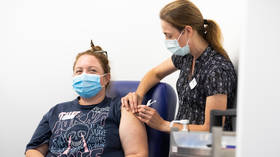Australian PM shifts blame for country’s slow vaccine roll-out on expert medical body’s ‘cautious approach’ & ‘constrained advice’

Australian Prime Minister Scott Morrison has blamed the “cautious approach” to vaccination adopted by its expert health advisory panel for creating “public confusion,” which has resulted in the country’s sluggish vaccine roll-out.
Over the past month, Morrison and the Australian Technical Advisory Group on Immunisation (ATAGI) have offered sometimes conflicting advice on the AstraZeneca vaccine, which is domestically produced and was expected to be the backbone of Australia’s Covid-19 vaccination campaign.
In June, ATAGI had recommended that people aged under 60 seek the Pfizer vaccine, citing the risk of rare but potentially deadly blood clots in those receiving the AstraZeneca shot. But Morrison then downplayed that advice as a “preference” and said nothing precluded people under that age threshold from getting the jab.
“We have had a cautious approach in Australia on medical advice. We wanted to follow all the usual steps and processes to ensure the vaccines were appropriately qualified before they were used in the community,” he told ABC Radio on Thursday.
Noting that the AstraZeneca vaccine had been “subject to some very constrained medical advice,” Morrison said the ATAGI recommendations had had a “very significant impact” on the vaccine’s distribution and availability to the broader population.
Also on rt.com Australia’s top doctors’ body opposes PM’s ‘surprise’ move to defy health advice and allow AstraZeneca shots for people under 40The PM’s comments came after ATAGI updated its vaccination guidelines on Tuesday to recommend that people under 60 in Covid-19 outbreak zones should consider taking the AstraZeneca vaccine if they did not have access to the Pfizer shot. The advice for those outside these areas remained the same, it said.
“In outbreak settings, the benefits of [the] Covid-19 vaccine [manufactured by] AstraZeneca are increased compared with non-outbreak settings. When the virus is spreading in the community, it is critical that as many people as possible are vaccinated as quickly as possible,” the updated statement noted.
The advice was updated as Australia struggled to contain outbreaks of the highly contagious Delta variant of the virus. Its two largest cities, Sydney and Melbourne, which are home to nearly half the country’s 25 million population, are currently in lockdown.
However, Morrison said the medical advice had “changed on two occasions” and was based “on an assumption cases would remain low.” He claimed this was ATAGI’s assumption and it “definitely” had “implications for the roll-out.”
“Now, when the case numbers increase, as you’ve seen from ATAGI, their advice changes. People have understood that, but I think it has created some confusion in the public,” Morrison said.
The PM had made similar comments on Wednesday, telling the 2GB radio station that ATAGI’s “very cautious” decisions had slowed down the government’s vaccine roll-out “considerably” and “put us behind.”
Also on rt.com Australian state of Victoria to enter its fifth lockdown amid Delta Covid threatATAGI pushed back against the accusations. Its co-chair, Allen Cheng, said the body was “always very conscious of the impacts of our recommendations on the program and vaccine confidence generally.”
“Based on evolving evidence, we’ve had to change that advice as new information became available,” Cheng told The Guardian Australia. He added that ATAGI had specific “terms of reference” to advise the health minister, but it was the government that had to “make decisions” and “run the program.”
A former ATAGI member who was part of the group’s deliberations till June told the publication she thought Morrison’s comments were “a bit unfair” and “disappointing.”
“This isn’t the time for a blame game – everyone has made the decisions they have made which were the best decisions with the evidence present at that time,” Debra Petrys said, adding that his comments were not “helpful” and had “unfairly put [ATAGI] into the spotlight at this time.”
Australia had been slow to sign vaccine agreements with manufacturers, meaning the vaccine program was supplied with only AstraZeneca and Pfizer shots. Pfizer jabs had also been in short supply due to the county’s small initial order of 10 million doses to cover its population.
According to the health minister, only 11.3% of the country’s vaccine-eligible adult population has so far been fully vaccinated.
If you like this story, share it with a friend!













